Story of Madrid's last X-rated cinema could be nearing its end
The documentary 'Paradiso' shows the day-to-day efforts of Cine Alba's only two employees Rafael and Luisa keep the old film theater running
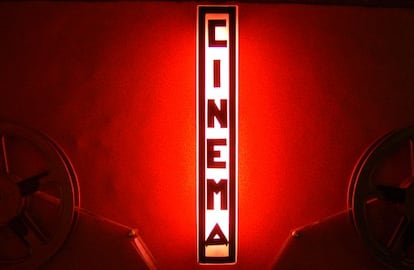
I wanted to ask you about these dress ties. I am interested in buying a large amount as a business gift," says Rafael Sánchez.
But the saleswoman at the Chinese discount store is immune to his bargaining powers, and eventually sells him 120 colorful ties for 1.40 euros apiece.
"We always like to give our clients a little something for Christmas," says the man who runs Cine Alba, Madrid's last movie theater specializing in porn films.
This particular cinema is located in a battered building that once housed the printing press of the liberal newspaper El Imparcial , between 1913 and 1933. The building is still heated with a venerable old boiler that is fed with spadefuls of coal. Its cavernous basements have been the setting of more than one horror movie, and have not collapsed altogether thanks to the do-it-yourself repair work that also keeps together the rest of this triangular construction connected to a small city palace.
Do-it-yourself maintenance has kept the basement from collapsing
In 1913, the newspaper founded by Eduardo Gasset y Artime (grandfather of the famous philosopher Ortega y Gasset) moved the newsroom to an elegant building flanked by small towers at 4, Calle del Duque de Alba. An annex was built right next to it, inside the inner courtyard, for the printing presses. And that connection spelled its doom one century later, explains one of the building owners, Miguel Ángel Barragán.
The city will not allow the palace to be restored to its former glory unless the annex that houses the cinema is first demolished and the old courtyard recovered. A zoning plan approved in 2006, before the property company owned by Barragán's father bought the building, declared the palace a landmark enjoying top historical and artistic protection.
The current owners have been battling local and regional red tape for months in an effort to restore the palace without touching the cinema. Part of the reason is because they need the movie theater's rent money (around 8,000 euros a month) and partly because they simply do not have the money to tear it down. But above all, they want to keep this courtyard extension because of its postwar charm and because their plan is to add it to a cultural center they want to open here. Their idea is to one day have rehearsal rooms and music classes in there, as well as spaces for private events.
But for now, it looks like its belly will continue to hold an X-rated film house.
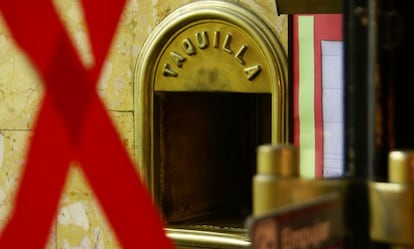
Similar complaints about local bureaucracy can be heard from Miguel Ángel Santa, one of the minds behind Triball, a project to turn a shady area behind Gran Vía into a trendy neighborhood. It is here, at 39 Corredera Baja de San Pablo, that another porn movie theater is living out its last days. An enormous yellow sign hung there by a real estate firm called Gorbea advertises that the 750-square meter space is available for rent "as of right now," says a company employee.
Spread out over three floors, the premises are going for 8,000 euros a month, more or less the same price as Cine Alba. There was a third film house specializing in porn on Calle Postas, but it shut down and the space has already been earmarked for a store that will fit right into this area near Plaza Mayor, where businesses focus almost exclusively on cheap gifts for tourists in a hurry.
The sign on Corredera Baja de San Pablo warns (and the property agent insists) that these premises are not fit for a café or restaurant.
"We tried to restore it to its natural use as a cultural center for film, plays and exhibitions. There were people who were very interested, entrepreneurs who wanted to screen off-circuit films, or for commercial events. But culture runs a deficit," Miguel Ángel Santa says, which is why the project could not work without some kind of food and drinks business on the side. "But you're not allowed to open so much as an ice cream parlor there."
This other cinema is housed on the spot where the Teatro Cervantes once stood before it burnt down to the ground, and unfortunately for it, it is located within an acoustic protection zone that prohibits new restaurants or cafés in an area that is already very loud.
"It's an aberration, but the city has refused to even talk about it. So with any luck, it will become a supermarket. That, or a Chinese discount store," says Santa.
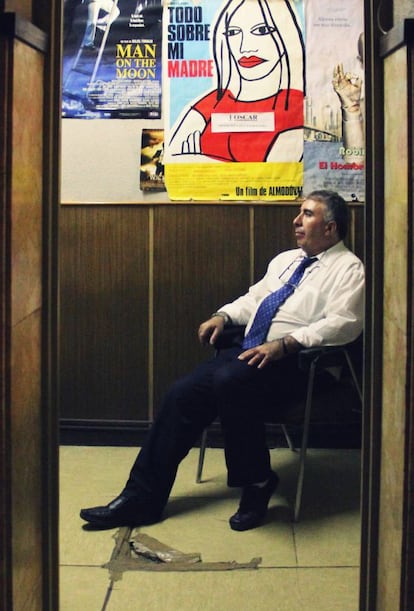
Although he does not say so in those terms, what Miguel Ángel Santa wants for this space is a buffet area just like the one at Cine Alba, which Rafael Sánchez so lovingly cares for and which is the key to its financial survival and the preservation of its soul.
"Most people who come here don't want to see the movie, they want to chat. They live in the neighborhood and they meet here for a drink or a bite," explains the building owner, Miguel Ángel Barragán.
This family atmosphere, full of friendliness and respect, is captured by Paradiso , a documentary made up of everyday situations in which Rafael Sánchez doubles as the cinema manager, decorator, operator and whatever else is necessary. He and the woman who sells the tickets at the box office, Luisa Martínez, are the sole employees and the hosts of Cine Alba.
The documentary captures some of the small talk inside the moviehouse hall: the topics range from the old currency, the peseta, to a former military camp colleague who is still sorely missed 40 years later. But most of all, there is talk about movies.
"Movies need to be seen at a movie theater, and if it's a big screen, all the better," says Rafael while Luisa nods in agreement. Meanwhile, the clients flirt or else go about their own business. The surrealistic dialogues of the porn flicks occasionally filter through. In another scene, Rafael buys a shapely mannequin and dresses it with Luisa's help, sometimes as a soccer player, sometimes as a salesperson from El Corte Inglés; somehow, this makes more sense than those lusty ladies in executive clothes depicted in the colorful posters that Rafael makes himself by hand.
Alba's artist
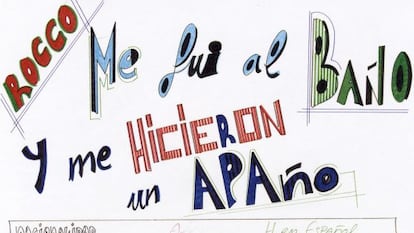
Cine Alba has been screening porn films since 1986, after 45 years of regular double features. Rafael Sánchez barely remembers that era: four years after starting to work as an assistant there, in 1975, the movie house began screening erotic films. Now its 380 seats are available to the public between 10.30am and 11pm continuously, with pauses marked by a bell, like in the old days.
The head of the company is Juan Ramón Gómez Fabra, president of the Federation of Spanish Movie Theaters and also the owner of the Palafox theater.
"Cine Alba is not losing money, and at some point it was even making some," he notes. "As long as the status quo remains, as long the building owners want to keep it and as long as no money is being lost, we will preserve it out of commitment to the staff there, Rafael and Luisa. Revenues have fallen 30 percent, but there is still a generation with its old habits, and as long as they're there... It is a singularity; they've created a very special atmosphere, yet a very serious one. What keeps that movie theater open is its relationship to the public, who feels right at home there."
"These days, people don't go watch movies; they go to consume movies," adds Rafael. "But what goes around comes around, like a film spool, and I think that if double features sessions returned, older people would still like it and young people would love to go to a double feature."
As a matter of fact, Rafael has already thought of the double feature he would screen: As Good as it Gets and Out of Africa . A big fan of Meryl Streep, who stars in the second film, he points out that "being beautiful and a good actress is not that easy - having it all is not that easy."
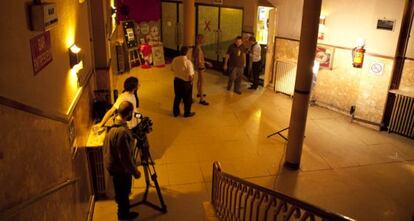
Filmmaker Omar Razzak and producer Mayi Gutiérrez spent nearly two years filming Paradiso during their free time with a 13,500-euro subsidy that was barely enough to buy the camera. Together with the screenwriter Daniel Remón and two other partners, they founded the production company Tourmalet, which first put out Paradiso and whose second project, Koala , has received critical acclaim at a number of festivals.
In one scene of the movie, Rafael is silent, leaning against the glass door, with nobody to talk to. Luisa's spot is occupied by a young woman who is busy with her cellphone. Possibly, Rafael was thinking about the anecdote he recounted a few weeks earlier: "As a boy, when I was five, I lived in Campamento, and I would go to the airfield of Cuatro Vientos with a rope - I thought I could catch the planes with a rope."
"He was a dreamer, and I think he hasn't changed; he still thinks that he can catch that plane with the rope," replied Luisa. Meanwhile, their dreams are still holding up Madrid's last porn movie theater.
Tu suscripción se está usando en otro dispositivo
¿Quieres añadir otro usuario a tu suscripción?
Si continúas leyendo en este dispositivo, no se podrá leer en el otro.
FlechaTu suscripción se está usando en otro dispositivo y solo puedes acceder a EL PAÍS desde un dispositivo a la vez.
Si quieres compartir tu cuenta, cambia tu suscripción a la modalidad Premium, así podrás añadir otro usuario. Cada uno accederá con su propia cuenta de email, lo que os permitirá personalizar vuestra experiencia en EL PAÍS.
¿Tienes una suscripción de empresa? Accede aquí para contratar más cuentas.
En el caso de no saber quién está usando tu cuenta, te recomendamos cambiar tu contraseña aquí.
Si decides continuar compartiendo tu cuenta, este mensaje se mostrará en tu dispositivo y en el de la otra persona que está usando tu cuenta de forma indefinida, afectando a tu experiencia de lectura. Puedes consultar aquí los términos y condiciones de la suscripción digital.








































